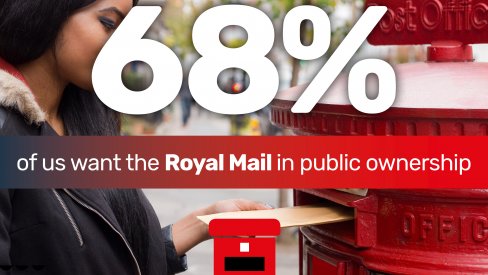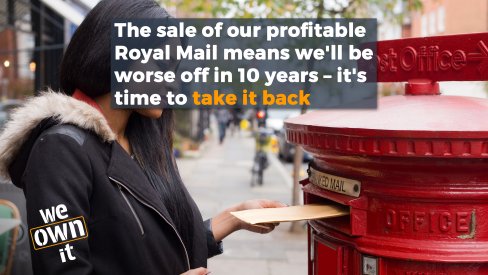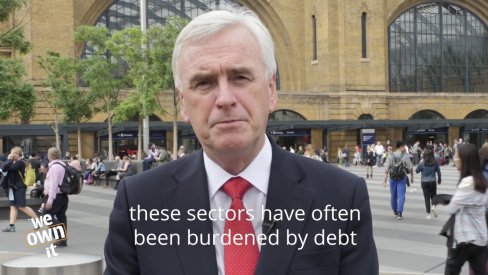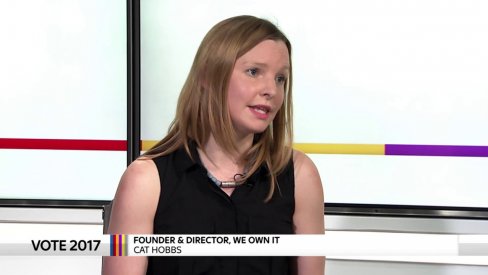
18 April 2018
Roy Mayall (pseudonym): author, postal worker and blogger writes about the the Royal Mail and its descent into privatisation.
I started working for the Royal Mail sometime after the turn of the Millennium. It was a job I had always wanted. Healthy, out in the fresh air, involving at least four hours a day of intense exercise, and a degree of autonomy, with no managers looking over my shoulder – at least while I was out on my round – it was the perfect job. Still is in many ways.
The basics of the job haven’t changed. I still walk from one address to the next sticking letters through letter boxes. What can possibly go wrong? Well a lot actually. They can destroy the industry by undermining the pension, introducing a form of fake competition, and then privatising it. Competition was introduced in the wake of the third EU Postal Services Directive of 2008, which required all postal markets to be opened up to other companies.
I say ‘fake competition’ because how can you introduce real competition into what is, in its essence, a natural monopoly?
The Royal Mail – or Post Office as it was more commonly known – had only ever been in the public sector during its entire 500 year history. It had created the whole distribution network – the systems, the methods, the procedures – as a seamless unity. Indeed, there’s a good argument to say that the Royal Mail is responsible for the creation of our modern-day nation. It brought together the different parts of the country by giving everyone an address and a post code, accessible to all for the price of a single stamp. How can there be real competition when one company, and one company alone, is required, under the Universal Service Obligation (USO) to deliver to every address, no matter how remote, in the whole of the United Kingdom: not only from Land’s End to John o’Groats, but from the Scilly Isles to the Outer Hebrides, from the Isle of Wight to the Isle of Man?
It’s easy to make a profit delivering from city to city, from London to Manchester to Glasgow, or from district to district inside the same city: much harder if you take in all the towns and villages as well; almost impossible if you include every isolated cottage, croft or farmstead in between. Only the Royal Mail is obliged to deliver to all of these. The way they engineered the competition was through a process called ‘downstream access’. Previous privatisations gave access to the industry network – the electricity grid, the water pipes or the gas pipes – to all the rival companies on an equal basis.
In the case of the postal industry the equivalent of this was us: the postal workers on our rounds. So the Royal Mail’s rivals were allowed to bid for the bulk mail and city-to-city contracts of all the main services – the banks, the utilities, the NHS, Amazon, eBay and all the rest – and then expect us to deliver it for them.
In other words, in this industry, me and my labour – my living, breathing, heart-pumping, energetic body – is viewed as the equivalent of the tangles of copper wires or the networks of underground pipes that serve as the infrastructure in other parts of the economy.
Even then the other companies would have been unable to make a mark. The Royal Mail was too big and too well-established. It could have crushed the other companies underfoot. So the government introduced a principle called ‘headroom’. When the Royal Mail charged the other companies for its downstream access services, it was obliged to leave financial space for them to make a profit. So there was never a ‘free market’. It was a highly regulated market from the outset: that is, the Royal Mail was regulated in order to allow the other companies the freedom to compete with each other.
And then there was privatisation, which took place in October 2013, as I’m sure you all remember. Part of the justification for this was that people’s habits were changing. People didn’t send letters any more: they sent emails and texts instead. If you listen to the Royal Mail, they will tell you that there has been a 40% drop in mail volumes in the last ten years. This might be true, although there does seem to be a marked increase in advertising mail at the same time. But the one thing they failed to mention was the increase in packets. The same technology that has effaced the ancient and noble art of letter-writing – never something the majority of the population engaged in anyway – has also, at the same time, allowed us to buy our goods online.
This has been by far the greatest shift in the industry since the onset of the digital revolution: the sheer number of packets we carry, a much more profitable enterprise.
I can’t believe the government hadn’t predicted this when they decided to sell off the Royal Mail, or that experts in the industry weren’t already aware of it. In other words, it’s been one giant-sized con from beginning to end.
The other element that comes into this has been the separation of the Post Office from the Royal Mail. The Post Office has always made a loss. The Royal Mail has always made a profit. By retaining the Post Office in public hands, while selling off the Royal Mail, they’ve ensured ever increasing profits for the private sector, and ever increasing burdens for the public. There’s been extraordinary pressure on Post Office Ltd, the government owned company that runs the counters that sell you your stamps, to cut costs and make efficiency savings. What this has meant is that post offices are being franchised out into supermarkets, where the staff are paid at retail trade rates under minimum hours contracts, rather than the well-paid and secure jobs that skilled post office workers used to command. The Post Office is no more than a minor adjunct of the retail industry these days. Most post offices are also grossly understaffed, which meant massive queues last Christmas… and for all Christmases to come, unless the industry is brought back together again.
It has turned me into a mere utility: an overground delivery system without a will of my own.
The management may not be looking directly over my shoulder, but they make me carry a PDA – a ‘postal delivery assistant’: effectively a tracking device – which tells them where I am and where and am heading every minute of the day. They make me work harder and faster for the same basic wage. They are constantly ratcheting up the pace and the work load, to make sure I do more work in the same number of hours. They have degraded me and degraded my job in order to squeeze out more profits for their shareholders. So you won’t be surprised to hear that most of the good will is gone. Postal workers are less and less likely to go into overtime. We are less and less likely to want to do management any favours.
That’s why we voted so overwhelmingly to strike last October – 89.1 per cent in favour on a turnout of 73.7 per cent – not only to secure our pensions and our jobs, but also to secure the future of the Royal Mail – for everyone!
In early February, the Royal Mail reached a deal with the CWU on workers rights, but as long as it is a privatised service it will continue to prioritise shareholders as opposed to workers, customers and the service itself.
Corbyn announced that Labour would choose to stay close to the EU after Brexit but not accept EU competition rules that encourage privatisation of natural monopolies. Labour want to bring Royal Mail services back into public ownership.
Watch our video on bringing the Royal Mail back into public ownership below, and please LIKE and SHARE this blog.












Comments
Dean Keith replied on Permalink
Agree with every word . I have been a postman since 1984 but no longer do deliveries , but when I did it was my favourite part of the job , even in the rain snow and cold it was great being out on my own . What has happened now to delivery staff is nothing short of a national scandal .
Andrew Walpole replied on Permalink
I am not an idealogue but this article to me has a very clear ring of truth.
Bob replied on Permalink
The competition rules that you mention are not an EU (although they are in EU law) they're a WTO rule.
Essentially, if you want to be able to compete in an area of someone else's industry you need to open that up yourself, you also need to separate state from the company so that it is not state subsidised.
Naomi Ridge replied on Permalink
Of course it should be publicly owned.
Joanna Patton replied on Permalink
Complete no-brainer. Royal Mail should never be in private hands. And don't get me started on the NHS!
artfulrobot replied on Permalink
I completely agree
Julia Dance replied on Permalink
How interesting to hear the actual experience of a postal worker. I was led to believe in the 60’s that mechanisation and computerisation would lead to shorter working hours, easier days and a more leisured life. Instead we have longer working hours more stress trying to do the jobs of several people and loneliness and depression are becoming norm.The postal worker delivering is often the only human contact many people have.
I despair of the politicians and business magnates who we have who have very little thought or care for the welfare of the working population. In all “public services” the first thing to be “adjusted” is the pension scheme. Look at teaching, working longer for less, fire services, it seems that only services that are absolutely needed like policing and minimum health care. Interesting that money can be found for these areas.
Britain has the longest working hours, fewest holidays, maternity/paternity leave and a failing education and health service. It is no surprise that they want to destroy an historically efficient postal service. I think it is called asset stripping, sell the good bits off to the highest bidder and wring your hands over the unprofitable poor service that is left struggling under constant criticism and lack of funding. Unless of course you can pay for a better private alternative. Most of us can’t do that, it is usually for the lucky few who have made money not working in the “public sector”. You can’t get teachers even with golden handcuff deals, they do their time and leave for easier better paid jobs. They can’t take their pensions if they leave early now.
Please can we have the same deal that the self serving career politicians have, with increasing pensions, wage rises, food subsidies, travel expenses and second homes? I think postal workers as the backbone of the should be entitled to the same.
Our so called society is failing and falling into misery, working people having to go to food banks to eat. Unexpected expenses putting them into the hands of extortionate lending companies.
The future promised much better happier lives yet we have more stress and misery than ever before. I am glad I am older now, better educated, happier, retired. I have enough money to live on comfortably. Why aren’t there more people like me instead of the unhappy, unrewarding lives that seem to be resigned to? I see a deteriorating future or a revolution for humanity.
Jim replied on Permalink
I left after 10 years off service. Genuinely enjoyed the job for best part of 5 years before the privatisation nonsense started. My experiences over the last 5 years of service steadily declined to the point it became unbearable. Between ATOS, OH Assist, bullying & harassment charges, impossible targets, threats, unpaid wages, challening integrity in relation to the 3.1 process were amongst some of the issues I faced on a daily basis. I no longer recognised the career I joined. It's a horrible place to work now, I pity every poor soul that has to endure working for Royal Mail. The greed and nastiness has ruined the good nature. The pressure and covert increase of workload such as all year lapsing, increased D2D, longer working hours without pay, threats regarding wilful delay, holidays and arrogant acting managers have in my view destroyed this once great place to work. Thank God I got out when I did.
Ian replied on Permalink
What is interesting we now have planners back in the office so all the walks should be fair and take you to your time, so now what happens with lapsing, interesting seems though wool pulled over your eyes again or RM back into the public hands of they keep giving us more and more i know for a start my legs can't take much more.
Brian replied on Permalink
Ive said the same thing to my work mates since all this started but my workmates just can not seem to see it. I was begging to think I was the only postie to recognise that the company are getting D.O,M.s to fill us with bull.
I've worked as a postie for nearly 25 yrs and I used to know all my customers, since privatisation and repick I know about 20 people, because I haven't got time for customer relations (as they used to call it). I hate the job now but need the money otherwise I would be away!
Oh while I remember in the last year 2017/18 1284 royal mail workers were pensioner off through sickness, of them 1224 were posties, surely that says something doesn't it?
David Egerton replied on Permalink
The philosophy in RMG has been "work harder, work faster, for less" ever since the beginning of the restructuring. Staff now routinely do not take their entitled meal breaks, work unpaid overtime and live in fear of losing their jobs. Any company that routinely issues "attendance warnings" to people who have been injured or become sick...
mark francis replied on Permalink
I have been at royal mail 16yrs and really enjoyed it when i started and each day when i finished work i still had the energy to go out running but these days i am working harder and the job has become very stressful we dont even have time for a proper break or to have a chat with customers out on the round.
Allen Jasson replied on Permalink
Having watched the Privatisation process for over 40 years in both my native Australia and the UK (beginning with the "privatisation" of our governments as Tory wolves Sheep's clothing - Bob Hawke and Tony Blair - took control of Labour) I've seen how the Media and corrupt governments collaborated in what amounts to a dare-faced theft, I've seen the results and I know the game plan. When these assets have been completely stripped and run down to the point of both unprofitable and unsustainable the government will have to buy them back at inflated price using debt financed by the privatisation looters. The whole system is utterly corrupt - we need to call it in and declare "Game Over".
Add new comment